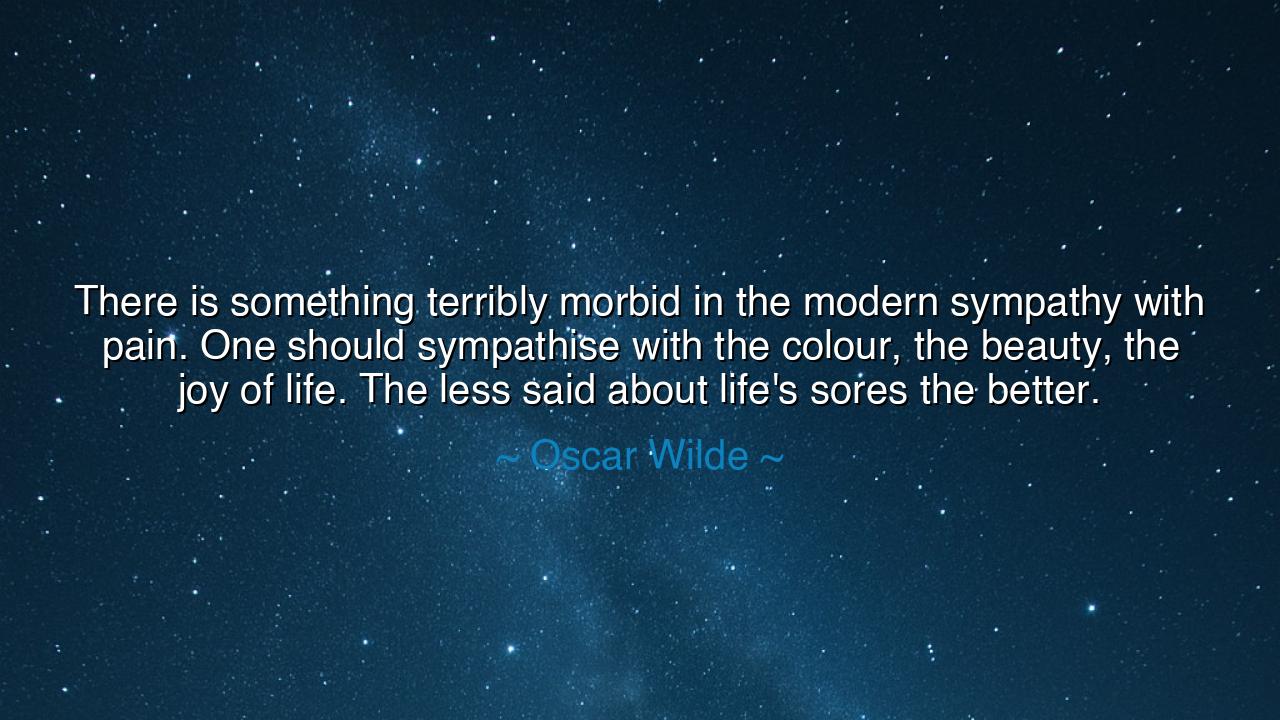
There is something terribly morbid in the modern sympathy with
There is something terribly morbid in the modern sympathy with pain. One should sympathise with the colour, the beauty, the joy of life. The less said about life's sores the better.






Hear the voice of Oscar Wilde, the poet of paradox and prophet of beauty, who declared with both severity and light: “There is something terribly morbid in the modern sympathy with pain. One should sympathise with the colour, the beauty, the joy of life. The less said about life’s sores the better.” These words carry the fragrance of his philosophy, a warning against the age-old temptation to glorify suffering, to dwell upon wounds as though they were crowns. Wilde calls us back to the celebration of beauty, of radiance, of all that uplifts the human spirit rather than drowns it in despair.
The meaning of this saying lies in Wilde’s disdain for the obsession with misery. He lived in a world where artists, critics, and even polite society were often enthralled by tragedy, by the performance of sorrow, as if to sympathize with pain were the highest virtue. But Wilde, the apostle of aestheticism, argued that true sympathy should rest not in the endless recounting of wounds, but in the recognition and celebration of life’s joys, its colours, its beauty. To speak continually of suffering is to let it rule; to uplift the splendour of life is to remind humanity of what is worth living for.
The ancients too grappled with this truth. In the tragedies of Sophocles, sorrow was never meant to be adored for its own sake, but to reveal the fragility of human pride and the need for wisdom. Yet in the festivals of Dionysus, the Greeks also danced and sang, glorifying wine, harvest, and the ecstatic joy of existence. Wilde, like the Greeks, sought balance, yet leaned toward life’s brightness, warning against the perverse delight in endlessly caressing life’s sores. His was not a call to deny pain, but to resist making pain the central altar of devotion.
Consider the example of Victor Hugo’s Les Misérables, a work drenched in human sorrow—poverty, injustice, despair. Yet what endures from that book is not only the pain but the radiant thread of redemption, love, and sacrifice. The story compels us not because it glorifies wounds, but because it shows the beauty that grows from them. Wilde’s criticism is against those who stop at the wound, who exalt the sore itself rather than the healing or the joy that may blossom beyond it.
The lesson is clear: do not linger too long in the house of suffering. To speak only of misery is to magnify it, to let it consume more than it deserves. Life is not defined solely by its sorrows, and sympathy that dwells only on suffering becomes morbid, a shadow that dims the soul. True sympathy elevates what is noble and beautiful in others—their laughter, their hope, their courage. To dwell in joy is not to ignore pain, but to refuse to let pain have the final word.
Practical action follows: when you encounter another’s hardship, do not merely rehearse their sorrow back to them. Instead, remind them of their strength, of the colours that still shine in their life, of the joy that waits beyond the wound. In your own heart, do not glorify your miseries, nursing them as treasures. Instead, practice gratitude, cultivate beauty, and seek out joy wherever it may be found. This is the kind of sympathy Wilde calls for—not the indulgence of despair, but the affirmation of life’s splendour.
So let Wilde’s words endure as a flame against darkness: “One should sympathise with the colour, the beauty, the joy of life.” The world is full of sorrow, and it will find us soon enough without our calling it forth at every turn. Let us not worship pain, but celebrate life. For in the end, it is not the sores of existence that give us strength, but the colours of dawn, the laughter of friends, the beauty of love, and the radiant joy of being alive. This is the true sympathy—not with pain, but with life itself.






AAdministratorAdministrator
Welcome, honored guests. Please leave a comment, we will respond soon